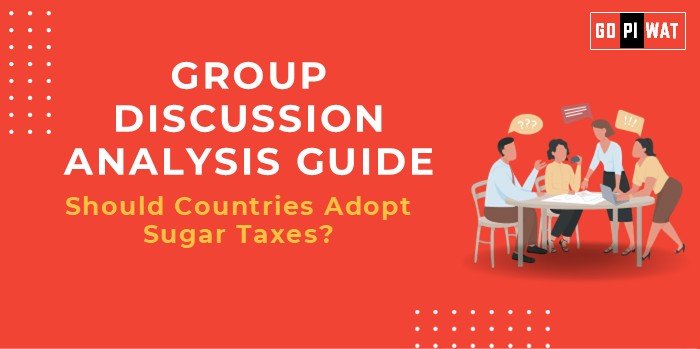📋 Group Discussion Analysis Guide: Should Countries Adopt Sugar Taxes to Reduce Consumption of Unhealthy Food and Drinks?
🌐 Introduction to Sugar Taxes
Opening Context:
With global obesity rates surging, governments are exploring sugar taxes to curb the consumption of sugary foods and beverages. Such taxes aim to tackle public health crises, including diabetes, obesity, and cardiovascular diseases.
Topic Background:
Introduced in Mexico in 2014, sugar taxes have gained traction worldwide, with over 40 countries implementing similar measures. These taxes aim to reduce sugar consumption and raise awareness about healthier dietary choices.
📊 Quick Facts and Key Statistics
- 🌍 Global Obesity Rates: Over 39% of adults are overweight; 13% are obese (WHO, 2023).
- 🇲🇽 Mexico’s Sugar Tax Impact: A 5% reduction in sugary drink consumption in its first year.
- 💰 Health Costs: Unhealthy diets contribute to over $2 trillion in global healthcare costs annually (World Bank, 2023).
- 🇬🇧 UK Sugar Tax Results: 28% reduction in sugar content of soft drinks within two years.
- 🇺🇸 US Consumption Trends: Average American consumes 17 teaspoons of added sugar daily, double the recommended limit (CDC, 2023).
👥 Stakeholders and Their Roles
- 🏛️ Governments: Implement taxation policies and allocate revenues for public health initiatives.
- 🍔 Food & Beverage Industry: Reformulate products or resist regulations.
- 🛒 Consumers: Adapt purchasing habits in response to price changes.
- 💡 Health Advocates: Push for regulations and educate the public about sugar’s health risks.
🏆 Achievements and Challenges
✨ Achievements:
- ✅ Behavioral Change: Declines in sugary drink sales in countries like Mexico and the UK.
- 📢 Public Health Awareness: Promotes discourse on nutrition and health.
- 💸 Revenue Generation: Funds public health campaigns and infrastructure.
- 🥗 Reformulation Incentives: Encourages companies to create healthier alternatives.
⚠️ Challenges:
- 💳 Economic Burden: Criticism for disproportionately affecting low-income groups.
- 🏭 Industry Pushback: Lobbying against taxes by major corporations.
- 🔄 Evasion Tactics: Shift to untaxed or cheaper alternatives.
🌍 Global Comparisons:
- 🇲🇽 Mexico: Sugar tax reduced sugary drink sales by 5-10%.
- 🇳🇴 Norway: Long-standing soda taxes correlate with lower sugar consumption.
📚 Case Studies:
- 🇬🇧 UK: Success in reducing sugar in drinks but not in snacks.
- 🇿🇦 South Africa: Significant decrease in sugar sales post-tax introduction.
💬 Structured Arguments for Discussion
- ✔️ Supporting Stance: “Sugar taxes incentivize healthier choices and reduce long-term healthcare costs.”
- ❌ Opposing Stance: “Such taxes unfairly burden low-income families without addressing underlying dietary habits.”
- 🔄 Balanced Perspective: “While sugar taxes have shown benefits, they must be paired with education and broader nutrition policies for lasting impact.”
🎯 Effective Discussion Approaches
🚀 Opening Approaches:
- 📊 Statistical Insight: “In the UK, sugar taxes led to a 28% reduction in sugar content within two years.”
- ⚖️ Contrast Argument: “Despite growing sugar taxes worldwide, obesity rates in many countries continue to rise.”
💡 Counter-Argument Handling:
- 💵 Criticism of low-income impact: Emphasize potential subsidies for healthier foods.
- 🔍 Revenue misuse concerns: Advocate for transparent allocation of funds to health programs.
🔍 Strategic Analysis of Strengths and Weaknesses
- 💪 Strengths: Promotes healthier behavior; generates revenue for public health.
- ⚖️ Weaknesses: Disproportionate impact on low-income groups; limited product coverage.
- 🌱 Opportunities: Support local agriculture; develop healthier food markets.
- ⚠️ Threats: Corporate lobbying; consumer backlash.
🎓 Connecting with B-School Applications
🌐 Real-World Applications:
- 📈 Marketing strategies for healthier products.
- 🏛️ Public policy roles in promoting health economics.
🤔 Sample Interview Questions:
- ❓ “Should sugar taxes focus only on beverages, or extend to all sugary products?”
- ❓ “How can governments mitigate the regressive effects of sugar taxes?”
💡 Insights for B-School Students:
- 🔍 Explore business opportunities in health-focused consumer goods.
- 📊 Analyze fiscal policy impacts on consumer behavior.


